Understanding the Inner Workings of a Car Air Conditioning Compressor

When it comes to beating the heat during the summer months, a car’s air conditioning system plays a crucial role in keeping you cool and comfortable. At the heart of this system lies the car air conditioning compressor, which is responsible for circulating and compressing the refrigerant fluid to cool the air inside the vehicle.
The car air conditioning compressor works by utilizing the principles of gas compression and refrigeration. It is typically powered by a belt connected to the engine, allowing it to be driven by the engine’s rotation. When the compressor is activated, it begins to draw in low-pressure refrigerant gas from the evaporator. This gas is then compressed, raising its temperature and pressure, before sending it to the condenser to release the heat.
One of the key components of a car air conditioning compressor is the compressor clutch, which engages and disengages the compressor from the engine. This allows the compressor to turn on and off as needed, depending on the desired temperature inside the car. When the temperature needs to be lowered, the compressor clutch is engaged, and the compressor starts circulating the refrigerant fluid. Once the desired temperature is reached, the clutch disengages, and the compressor stops running.
In addition to the compressor clutch, the car air conditioning compressor also includes other important components such as the compressor pulley, pressure relief valve, and control valves. These components work together to regulate the flow and pressure of the refrigerant fluid, ensuring that the air conditioning system operates efficiently and effectively.
Understanding the inner workings of a car air conditioning compressor is essential for proper maintenance and troubleshooting of the air conditioning system. By knowing how the compressor operates and the role it plays in cooling the air inside the car, you can better diagnose and address any issues that may arise. Regular maintenance and inspection of the compressor and its components can help prolong the life of the air conditioning system and ensure that it continues to function optimally during those hot summer days.
What is a Car Air Conditioning Compressor?
A car air conditioning compressor is a vital component of a vehicle’s air conditioning system. It is responsible for compressing and circulating refrigerant gas throughout the system, which ultimately cools down the air that is blown into the cabin of the car.
The compressor itself is typically a small, cylindrical device that is powered by the engine of the car. It is connected to the engine via a belt and pulley system, allowing it to be driven by the engine’s rotation. When the air conditioning system is turned on, the compressor begins to operate, pressurizing the refrigerant gas.
Inside the compressor, there are several key components:
- The piston: As the engine turns the compressor, the piston moves up and down within a cylinder, compressing the refrigerant gas.
- The intake and discharge valves: These valves control the flow of the refrigerant gas in and out of the compressor.
- The motor: The motor provides the power to rotate the compressor and drive the piston.
The compressed refrigerant gas is then sent to the condenser, where it releases heat and transforms into a high-pressure, high-temperature gas. From there, it goes through the rest of the air conditioning system, including the evaporator and the expansion valve, before returning to the compressor to start the cycle again. This continuous cycle is what allows the air conditioning system to cool down the air inside the car.
How Does a Car Air Conditioning Compressor Work?
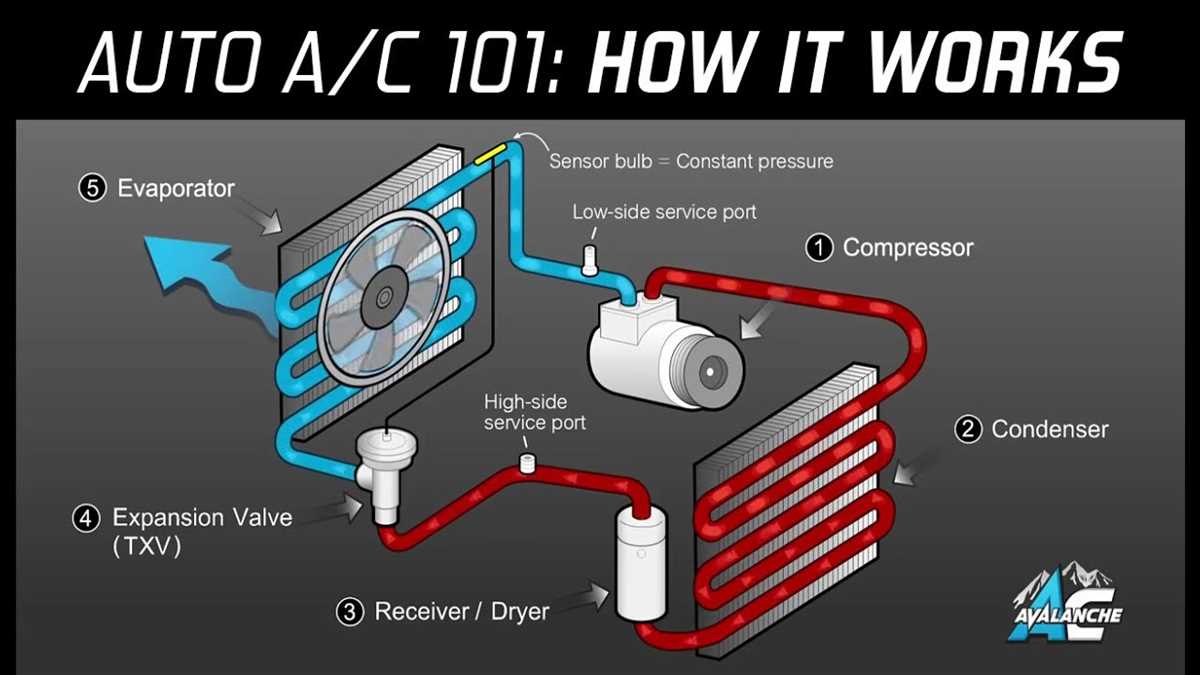
The car air conditioning compressor is a crucial component of the AC system, responsible for compressing and circulating the refrigerant in order to cool the cabin of the vehicle. It works by utilizing a belt-driven pump that is powered by the car’s engine.
The compressor plays a central role in the refrigeration cycle. It receives low-pressure, low-temperature refrigerant from the evaporator, and then compresses it into a high-pressure, high-temperature gas. This compressed gas flows through the condenser, where it releases heat and transforms back into a liquid state. The liquid refrigerant then passes through an expansion valve, which reduces its pressure and temperature before entering the evaporator.
Inside the evaporator, the low-pressure liquid refrigerant absorbs heat from the air inside the car’s cabin, evaporating into a gas once again. This cooled gas is then sent back to the compressor, where the cycle repeats. The continuous circulation of refrigerant through the compressor ensures that the air inside the car is continually cooled and dehumidified.
It’s important to note that the car air conditioning compressor relies on a lubricating oil to prevent excessive wear and tear on its moving parts. The oil is mixed with the refrigerant and circulated throughout the AC system. This lubrication is essential for the proper functioning and longevity of the compressor.
In summary, the car air conditioning compressor works by compressing the refrigerant, circulating it through the AC system, and transforming it from a gas to a liquid and back again. This process removes heat from the air inside the car, providing cool and comfortable conditions for the occupants. Regular maintenance and attention to the compressor and its oil level are important to ensure the optimal performance of the AC system.
The Components of a Car Air Conditioning Compressor
The car air conditioning compressor is a vital component of the car’s cooling system, responsible for compressing and circulating the refrigerant gas. It is a complex device, consisting of several important components that work together to ensure the efficient operation of the air conditioning system.
1. Compressor Housing:
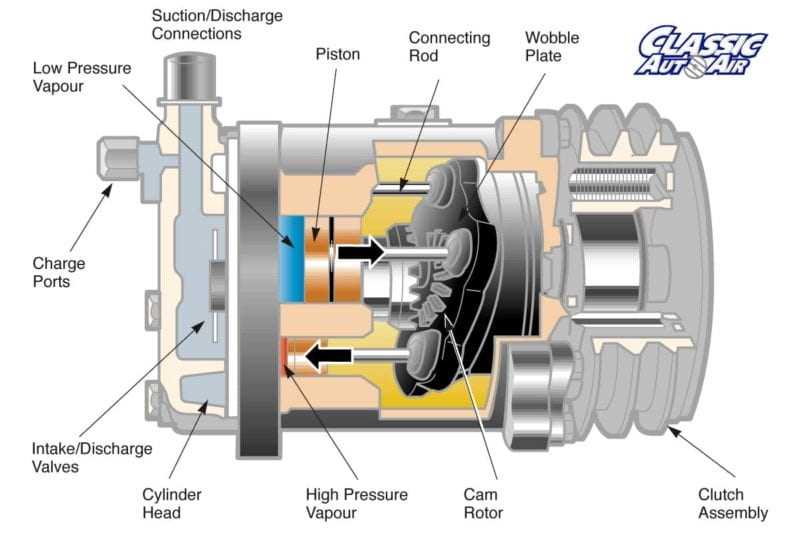
The compressor housing serves as the outer shell of the compressor, protecting the internal components from external damage. It is usually made of durable materials such as aluminum or cast iron, and it is designed to withstand high pressures and temperatures.
2. Pulley and Clutch:
The pulley and clutch assembly is responsible for driving the compressor and engaging or disengaging it from the engine. The pulley rotates when the engine is running, and the clutch allows the compressor to be activated or deactivated as needed.
3. Compressor Pump:
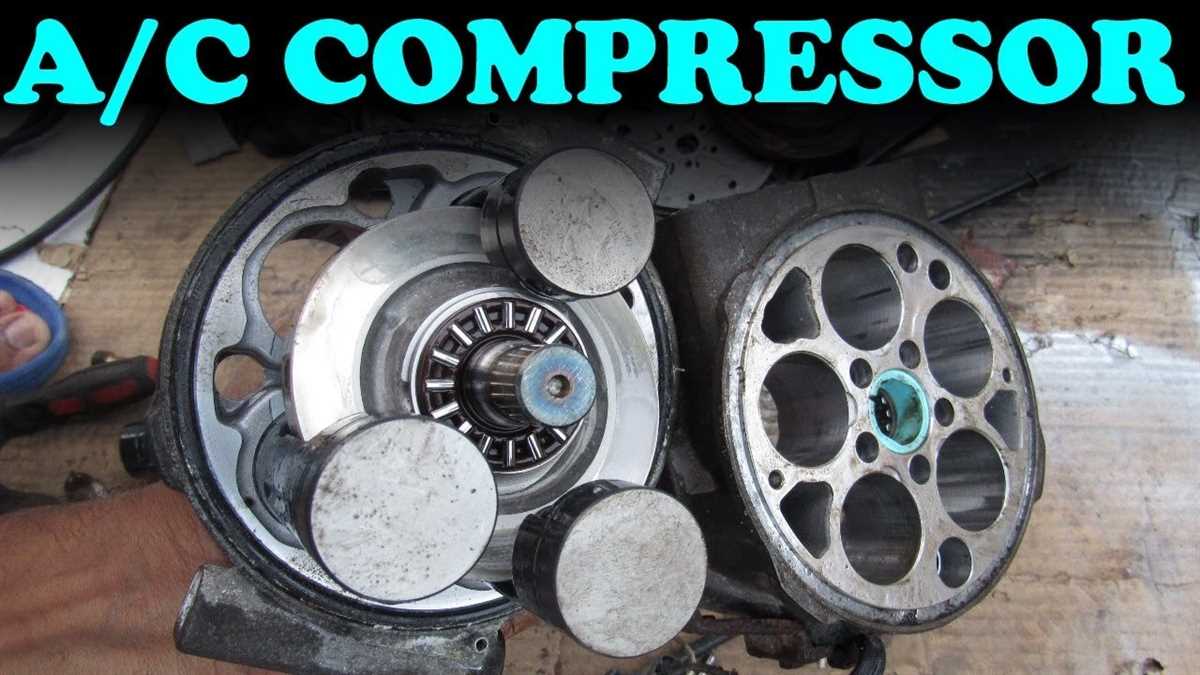
The compressor pump is the heart of the air conditioning compressor. It consists of a piston, cylinder, and valves that work together to compress the refrigerant gas. As the piston moves, it creates pressure in the cylinder, causing the refrigerant gas to compress and increase in temperature.
4. Evaporator Coil:
The evaporator coil is responsible for absorbing heat from the surrounding air and cooling it down. It is located inside the car’s cabin and is connected to the compressor via refrigerant lines. As the compressed refrigerant passes through the evaporator coil, it evaporates and absorbs heat, resulting in cooler air being circulated inside the car.
5. Condenser Coil:
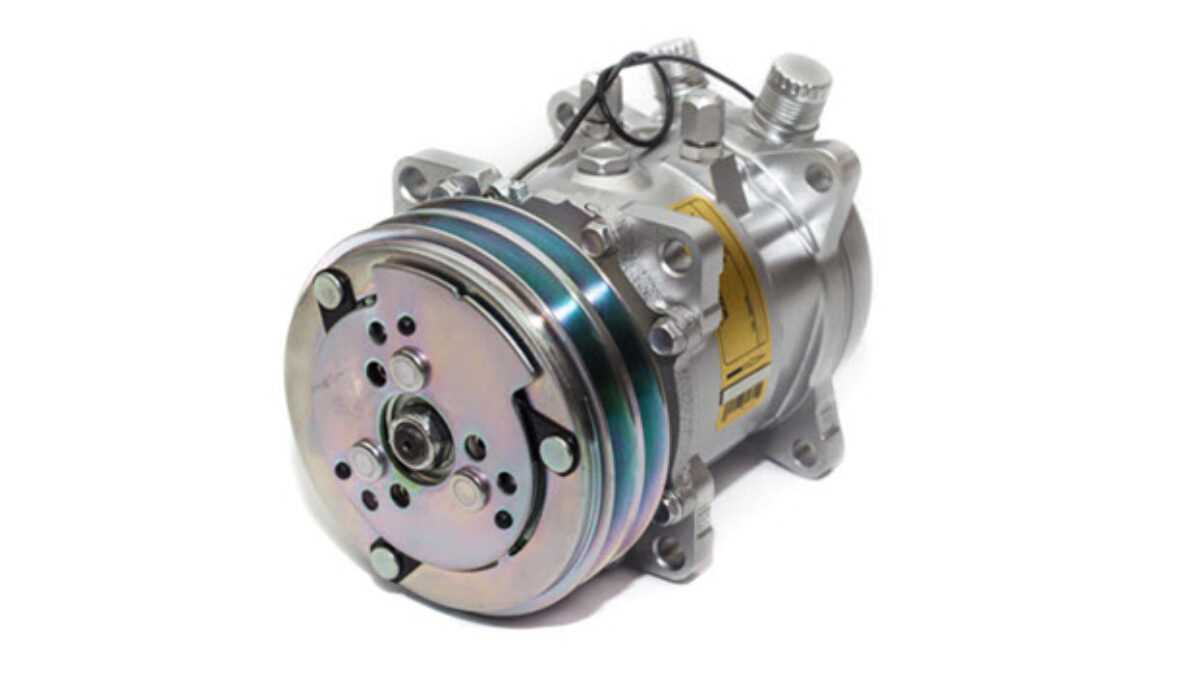
The condenser coil is located in front of the car, usually near the radiator. It acts as a heat exchanger, transferring heat from the compressed refrigerant to the surrounding air. As the hot refrigerant flows through the condenser coil, it releases heat and turns back into a liquid, ready to be circulated back to the compressor for another cycle.
6. Expansion Valve:
The expansion valve regulates the flow of refrigerant into the evaporator coil. It is a small valve that controls the amount of refrigerant that enters the coil, ensuring that the correct amount of cooling is achieved. It also helps to reduce the pressure of the refrigerant, allowing it to expand rapidly and absorb heat from the air.
In conclusion, the car air conditioning compressor is a complex device with several components working together to ensure the efficient cooling of the car’s interior. Each component plays a crucial role in the compression, circulation, and cooling of the refrigerant gas, resulting in comfortable and cool air for the passengers.
Common Problems with Car Air Conditioning Compressors
1. Insufficient Cooling
One common problem with car air conditioning compressors is insufficient cooling. This can be caused by a variety of factors, such as a low refrigerant level, a faulty compressor clutch, or a clogged condenser. When the compressor is not able to properly compress the refrigerant, it results in reduced cooling performance. It is important to diagnose and fix the underlying issue in order to restore the cooling efficiency of the system.
2. Compressor Failure
Compressor failure is another common problem faced by car air conditioning systems. This can be due to a variety of reasons, including worn-out seals, damaged pistons, or electrical issues. A failing compressor will result in the air conditioning system not working at all. In such cases, the compressor will need to be repaired or replaced in order to restore the functionality of the system.
3. Noisy Compressor
A noisy compressor is another issue that car owners may encounter with their air conditioning systems. This can be caused by a variety of factors, such as loose components, worn-out bearings, or a failing clutch. When the compressor becomes noisy, it not only affects the comfort of the passengers but also indicates a potential problem that needs to be addressed. It is important to diagnose and fix the underlying cause of the noise to prevent further damage to the compressor.
4. Refrigerant Leaks
Refrigerant leaks are a common problem in car air conditioning systems, and they can lead to reduced cooling performance. These leaks can occur in various components of the system, including the compressor. When refrigerant leaks from the compressor, it not only affects the cooling efficiency but also poses environmental concerns. It is important to identify and fix any refrigerant leaks in order to maintain the proper functioning of the air conditioning system.
5. Overheating Compressor
Overheating of the compressor is another common problem that can occur with car air conditioning systems. This can be caused by factors such as a malfunctioning cooling fan, a clogged condenser, or a low refrigerant level. An overheating compressor can lead to system failure and costly repairs. It is important to address the issue promptly to prevent further damage and ensure the longevity of the air conditioning system.
Overall, car air conditioning compressors can experience a range of problems, from insufficient cooling to compressor failure. It is important for car owners to be aware of these common issues and to address them promptly in order to maintain the proper functioning of their air conditioning systems. Regular maintenance and prompt repairs can help extend the lifespan of the compressor and ensure optimal cooling performance.
How to Maintain Your Car Air Conditioning Compressor
Regular Inspection
One of the most important steps in maintaining your car air conditioning compressor is to regularly inspect it. Check for any signs of leaks, such as oil stains or wet spots around the compressor. Inspect the belts for any signs of wear and tear and ensure they are properly tightened. It is also important to check the electrical connections and wiring to ensure they are secure.
Cleaning
Cleaning your car air conditioning compressor is crucial to its proper functioning. Make sure to clean the compressor and its surrounding areas regularly to prevent the buildup of dust, debris, and other contaminants. Use a soft brush or cloth to remove any dirt or grime. Avoid using harsh chemicals that may damage the compressor.
Lubrication
Lubricating the car air conditioning compressor is essential to prevent friction and ensure smooth operation. Follow the manufacturer’s instructions to determine the appropriate type and amount of lubricant to use. Apply the lubricant to the necessary areas, such as the compressor shaft and bearings, to keep them properly lubricated. Regular lubrication will help prolong the life of your compressor.
Proper Usage
Using your car air conditioning system properly can help maintain the compressor’s health. Avoid running the system at full blast for an extended period of time, as this can put excessive strain on the compressor. Use the air conditioning system in moderation and turn it off when not needed. This can help prevent overheating and reduce unnecessary wear and tear on the compressor.
Professional Maintenance
While regular inspection and cleaning can go a long way in maintaining your car air conditioning compressor, it is also important to have it professionally serviced. Regular maintenance by a qualified technician will ensure that any potential issues are addressed early on and prevent more costly repairs down the line. Schedule regular maintenance appointments to keep your car air conditioning compressor in optimal condition.
In conclusion, maintaining your car air conditioning compressor is crucial for its proper functioning and longevity. Regular inspection, cleaning, lubrication, proper usage, and professional maintenance are all important steps to ensure the health of your compressor. By taking these measures, you can enjoy cool and comfortable rides for years to come.
When to Replace a Car Air Conditioning Compressor
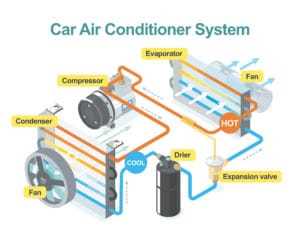
Symptoms of a failing compressor
If your car’s air conditioning system is not cooling properly, it could be a sign that the compressor is failing. The compressor is responsible for compressing and circulating refrigerant, so if it is not functioning properly, the air conditioning system will not work as it should. Other symptoms of a failing compressor include strange noises coming from the engine compartment, leaks or puddles of refrigerant under the car, and a burning smell when the air conditioning is turned on.
Causes of compressor failure
There are several factors that can contribute to compressor failure. One common cause is a lack of maintenance, such as not changing the air filter or refrigerant regularly. This can lead to a buildup of dirt and debris that can damage the compressor. Another cause is a refrigerant leak, which can cause the compressor to overwork and eventually fail. Additionally, running the air conditioning system on the highest setting for prolonged periods of time can strain the compressor and cause it to fail.
Replacing the compressor
If you suspect that your car’s air conditioning compressor needs to be replaced, it is important to have it inspected and diagnosed by a professional mechanic. They will be able to determine the exact cause of the issue and advise you on the best course of action. In most cases, a failing compressor will need to be replaced with a new one. This can be a costly repair, but it is essential for restoring the functionality of your car’s air conditioning system. It is important to address compressor issues promptly to avoid further damage to the air conditioning system.
FAQ:
What is the purpose of a car air conditioning compressor?
A car air conditioning compressor is responsible for compressing and circulating refrigerant gas, which is key to cooling the interior of a vehicle.
How does a car air conditioning compressor work?
A car air conditioning compressor works by using a belt connected to the engine to power a piston, which compresses the refrigerant gas. The compressed gas is then moved through the air conditioning system, where it releases heat and cools the air before it is circulated into the vehicle’s cabin.
What are the common signs of a faulty car air conditioning compressor?
Common signs of a faulty car air conditioning compressor include reduced cooling capacity, unusual noises coming from the compressor, leaking refrigerant, and the air conditioning system blowing warm air. If you notice any of these signs, it’s best to have your compressor inspected and repaired by a professional.
Can a car air conditioning compressor be repaired?
In some cases, a car air conditioning compressor can be repaired if the issue is minor, such as a faulty clutch or a refrigerant leak. However, in many cases, it is more cost-effective to replace the compressor. It’s best to consult with a professional technician to determine the best course of action for your specific situation.
Video:













